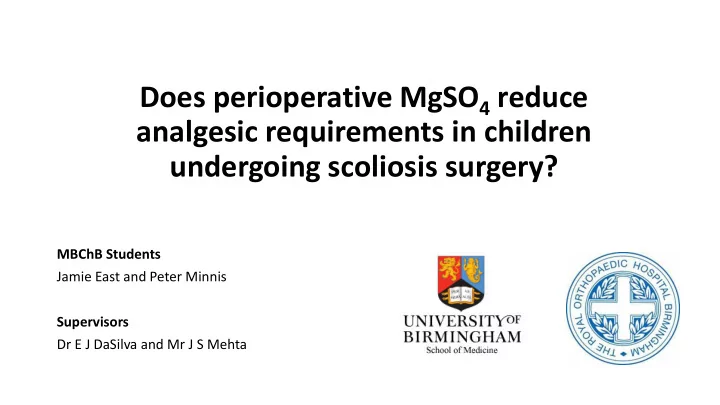

Does perioperative MgSO 4 reduce analgesic requirements in children undergoing scoliosis surgery? MBChB Students Jamie East and Peter Minnis Supervisors Dr E J DaSilva and Mr J S Mehta
3 Part Hypothesis 1. Spinal surgery causes muscle injury 2. Postoperatively, spinal muscle undergoes spasm 3. Spasm leads to severe pain, which is treated with opiate analgesics Reduced muscle spasm = Reduced opiate requirements?
Physiology of Magnesium • 2 nd most common intracellular cation • Roles include: • Cardiomyocyte stability (Torsades des pointes VF arrest) • Bronchodilator (status asthmaticus) • Reduces uterine tone and contractility (pre-eclampsia and eclampsia) • Magnesium can reduce muscle tone and has been proven to reduce opiate requirements in surgical patients
Mechanism of Action • Intracellular magnesium inhibits Ca 2+ release by blocking ryanodine receptors • Calcium cannot be released from intracellular stores – ACh isn’t released across NMJ • NMJ depolarisation rate reduces Anaesthetic Value? Magnesium during surgery can reduce opioid consumption in the first 24hr postoperatively
Methods • Inclusion criteria: • 12-18 year olds • Posterior scoliosis correction • Surgery within the past year • Exclusion criteria: • Patients with learning disability • Previous surgery • Growing spine procedures
Methods • Examined patient notes, recording all intraoperative and post-operative pain relief given and total days stay in hospital • Stratified patients: MgSO4 vs no MgSo4 (different anaesthetic practices during the same time period) • 2 groups were matched for age, sex, Cobb angles, correction indices and number of levels instrumented • Standardised opiate analgesics to oral morphine equivalent
Standardised Opiate Conversion Analgesic Route Dose Codeine PO 100mg Diamorphine IM, IV, SC 3mg Dihydrocodeine PO 100mg Morphine PO 10mg Morphine IM, IV, SC 5mg Oxycodone PO 6.6mg Tramadol PO 100mg Zomorph* PO 10mg PO = by mouth; IM = intramuscular, IV = intravenous, SC = subcutaneous
Key Findings Patients received Patients not receiving MgSO4 MgSO4 10 21 Number patients: Average post-op opiate requirement (mg PO morphine 252.4 mg 371.4 mg equivalent) Average length of stay (days) 5 6.2 % patients requiring adjuvant pain 30 % 66.6% medication Average dose Gabapentin (mg) 1067 mg 2838 mg received
n = 21 Non - Magnesium n = 10 Magnesium 0 100 200 300 400 500 600 700 Total Post-operative Opiate requirement – ( mg PO morphine equivalent )
n = 21 Non - Magnesium n = 10 Magnesium 3 4 5 6 7 8 9 Number of days stay (post-op)
To Summarise … Patients who received IV MgSO4 post-op: On average required 120mg less oral morphine post-op Spent 1.2 days less in hospital recovering Required less adjuvant medication
Confounding Factors • Degree of scoliosis correction • Complications of surgery – e.g. infection • Patient age • Dose of MgSO4 and timing of dose
Conclusions • Different analgesic requirements in patients receiving magnesium vs. those who did not. • Use of magnesium could: • Reduce patients’ opiate requirements & associated complications • Reduce patients’ adjuvant analgesic requirements • Reduce patients’ length of stay
Any Questions?
Recommend
More recommend